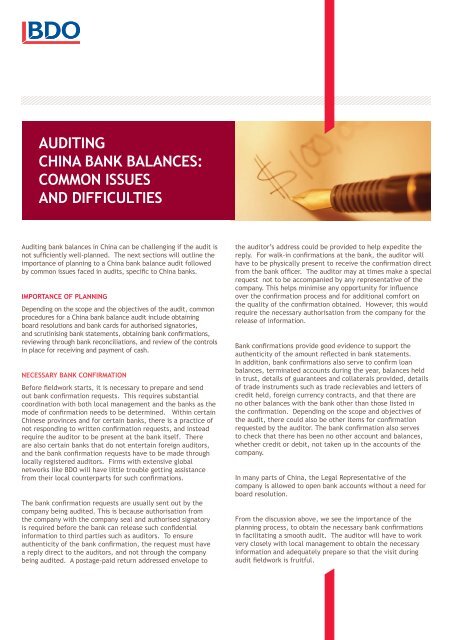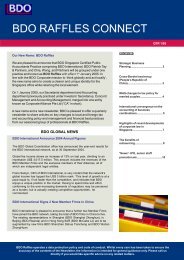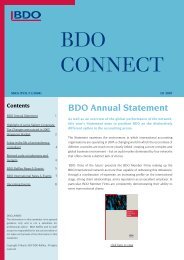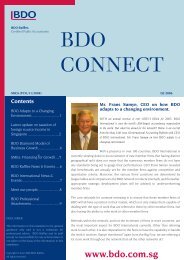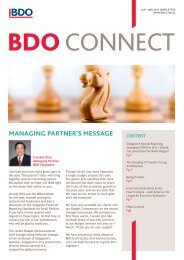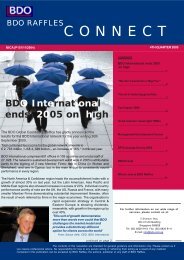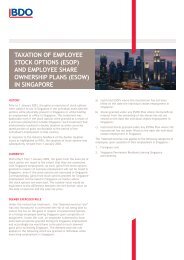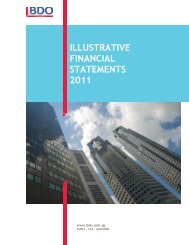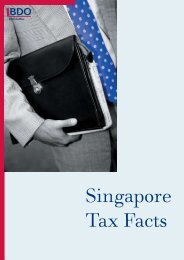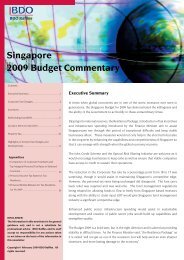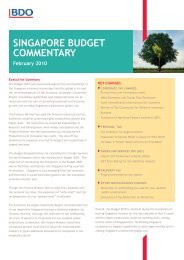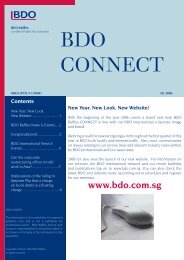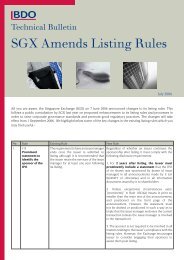auditing china bank balances: common issues and ... - bdo singapore
auditing china bank balances: common issues and ... - bdo singapore
auditing china bank balances: common issues and ... - bdo singapore
Create successful ePaper yourself
Turn your PDF publications into a flip-book with our unique Google optimized e-Paper software.
Auditing<br />
China <strong>bank</strong> <strong>balances</strong>:<br />
Common Issues<br />
<strong>and</strong> difficulties<br />
Auditing <strong>bank</strong> <strong>balances</strong> in China can be challenging if the audit is<br />
not sufficiently well-planned. The next sections will outline the<br />
importance of planning to a China <strong>bank</strong> balance audit followed<br />
by <strong>common</strong> <strong>issues</strong> faced in audits, specific to China <strong>bank</strong>s.<br />
Importance of planning<br />
Depending on the scope <strong>and</strong> the objectives of the audit, <strong>common</strong><br />
procedures for a China <strong>bank</strong> balance audit include obtaining<br />
board resolutions <strong>and</strong> <strong>bank</strong> cards for authorised signatories,<br />
<strong>and</strong> scrutinising <strong>bank</strong> statements, obtaining <strong>bank</strong> confirmations,<br />
reviewing through <strong>bank</strong> reconciliations, <strong>and</strong> review of the controls<br />
in place for receiving <strong>and</strong> payment of cash.<br />
Necessary <strong>bank</strong> confirmation<br />
Before fieldwork starts, it is necessary to prepare <strong>and</strong> send<br />
out <strong>bank</strong> confirmation requests. This requires substantial<br />
coordination with both local management <strong>and</strong> the <strong>bank</strong>s as the<br />
mode of confirmation needs to be determined. Within certain<br />
Chinese provinces <strong>and</strong> for certain <strong>bank</strong>s, there is a practice of<br />
not responding to written confirmation requests, <strong>and</strong> instead<br />
require the auditor to be present at the <strong>bank</strong> itself. There<br />
are also certain <strong>bank</strong>s that do not entertain foreign auditors,<br />
<strong>and</strong> the <strong>bank</strong> confirmation requests have to be made through<br />
locally registered auditors. Firms with extensive global<br />
networks like BDO will have little trouble getting assistance<br />
from their local counterparts for such confirmations.<br />
The <strong>bank</strong> confirmation requests are usually sent out by the<br />
company being audited. This is because authorisation from<br />
the company with the company seal <strong>and</strong> authorised signatory<br />
is required before the <strong>bank</strong> can release such confidential<br />
information to third parties such as auditors. To ensure<br />
authenticity of the <strong>bank</strong> confirmation, the request must have<br />
a reply direct to the auditors, <strong>and</strong> not through the company<br />
being audited. A postage-paid return addressed envelope to<br />
the auditor’s address could be provided to help expedite the<br />
reply. For walk-in confirmations at the <strong>bank</strong>, the auditor will<br />
have to be physically present to receive the confirmation direct<br />
from the <strong>bank</strong> officer. The auditor may at times make a special<br />
request not to be accompanied by any representative of the<br />
company. This helps minimise any opportunity for influence<br />
over the confirmation process <strong>and</strong> for additional comfort on<br />
the quality of the confirmation obtained. However, this would<br />
require the necessary authorisation from the company for the<br />
release of information.<br />
Bank confirmations provide good evidence to support the<br />
authenticity of the amount reflected in <strong>bank</strong> statements.<br />
In addition, <strong>bank</strong> confirmations also serve to confirm loan<br />
<strong>balances</strong>, terminated accounts during the year, <strong>balances</strong> held<br />
in trust, details of guarantees <strong>and</strong> collaterals provided, details<br />
of trade instruments such as trade recievables <strong>and</strong> letters of<br />
credit held, foreign currency contracts, <strong>and</strong> that there are<br />
no other <strong>balances</strong> with the <strong>bank</strong> other than those listed in<br />
the confirmation. Depending on the scope <strong>and</strong> objectives of<br />
the audit, there could also be other items for confirmation<br />
requested by the auditor. The <strong>bank</strong> confirmation also serves<br />
to check that there has been no other account <strong>and</strong> <strong>balances</strong>,<br />
whether credit or debit, not taken up in the accounts of the<br />
company.<br />
In many parts of China, the Legal Representative of the<br />
company is allowed to open <strong>bank</strong> accounts without a need for<br />
board resolution.<br />
From the discussion above, we see the importance of the<br />
planning process, to obtain the necessary <strong>bank</strong> confirmations<br />
in facilitating a smooth audit. The auditor will have to work<br />
very closely with local management to obtain the necessary<br />
information <strong>and</strong> adequately prepare so that the visit during<br />
audit fieldwork is fruitful.
Common Issues<br />
Next, we take a look at some <strong>common</strong> <strong>issues</strong> specific to<br />
Chinese companies. Unlike Singapore or Hong Kong, in China,<br />
it is a <strong>common</strong> practice for the authorised signatory for the<br />
operation of <strong>bank</strong> accounts to use of seals in place of h<strong>and</strong>written<br />
signatures. Usually, the minimum two seals required<br />
are the Legal Representative Seal <strong>and</strong> the Finance Seal. Some<br />
companies may choose to have additional seals for better<br />
control of <strong>bank</strong> accounts.<br />
The rationale for the establishment of payment limits is so<br />
that routine <strong>and</strong> less significant payments can be delegated to<br />
certain senior officers in the company, <strong>and</strong> that other unusual<br />
<strong>and</strong> significant payments above a threshold can be escalated<br />
for approval by higher authority, such as the CEO or the Board.<br />
However, if all payments are approved by the CEO, there is a<br />
risk that certain payments may escape proper review due to the<br />
sheer volume of the payments.<br />
The reasoning behind dual <strong>bank</strong> signatories is for proper<br />
segregation of duties; to not allow any one person to have full<br />
access to the <strong>bank</strong> account. However, in the context where<br />
seals are used in place of signatures, even with dual signatory<br />
imposed, the intended control can be overridden if both seals<br />
are being kept by an individual, or if an individual has access to<br />
both seals. A reason often cited for dual signatory practice is<br />
to faciliate operational expediency, so that payments could be<br />
processed easily without having both officers in custody of the<br />
seals review <strong>and</strong> approve the payments.<br />
Companies usually work within limitations by establishing<br />
mitigating controls such as internal payment authorisation<br />
limits, regular management reporting to head office, as well as<br />
ad-hoc reviews from head office personnel or other professionals<br />
so as to keep local management in check. A culture <strong>and</strong> the<br />
conduct of good corporate governance can help mitigate these<br />
limitations, but could take considerable education <strong>and</strong> effort to<br />
cultivate.<br />
Bank signatories are usually allowed to transact any amounts<br />
without any limits imposed. Banks in certain provinces may only<br />
recognise a single set of authorised signatories for <strong>bank</strong> cards<br />
regardless of the payment amount. However, more <strong>bank</strong>s in more<br />
larger cities such as Shanghai or Shenzhen do accept instructions<br />
for different set of signatories for different payment limits.<br />
Kwek Wee Heng<br />
Senior Manager<br />
Risk Advisory Services<br />
weeheng@<strong>bdo</strong>.com.sg<br />
Direct: +65 6828 9117


